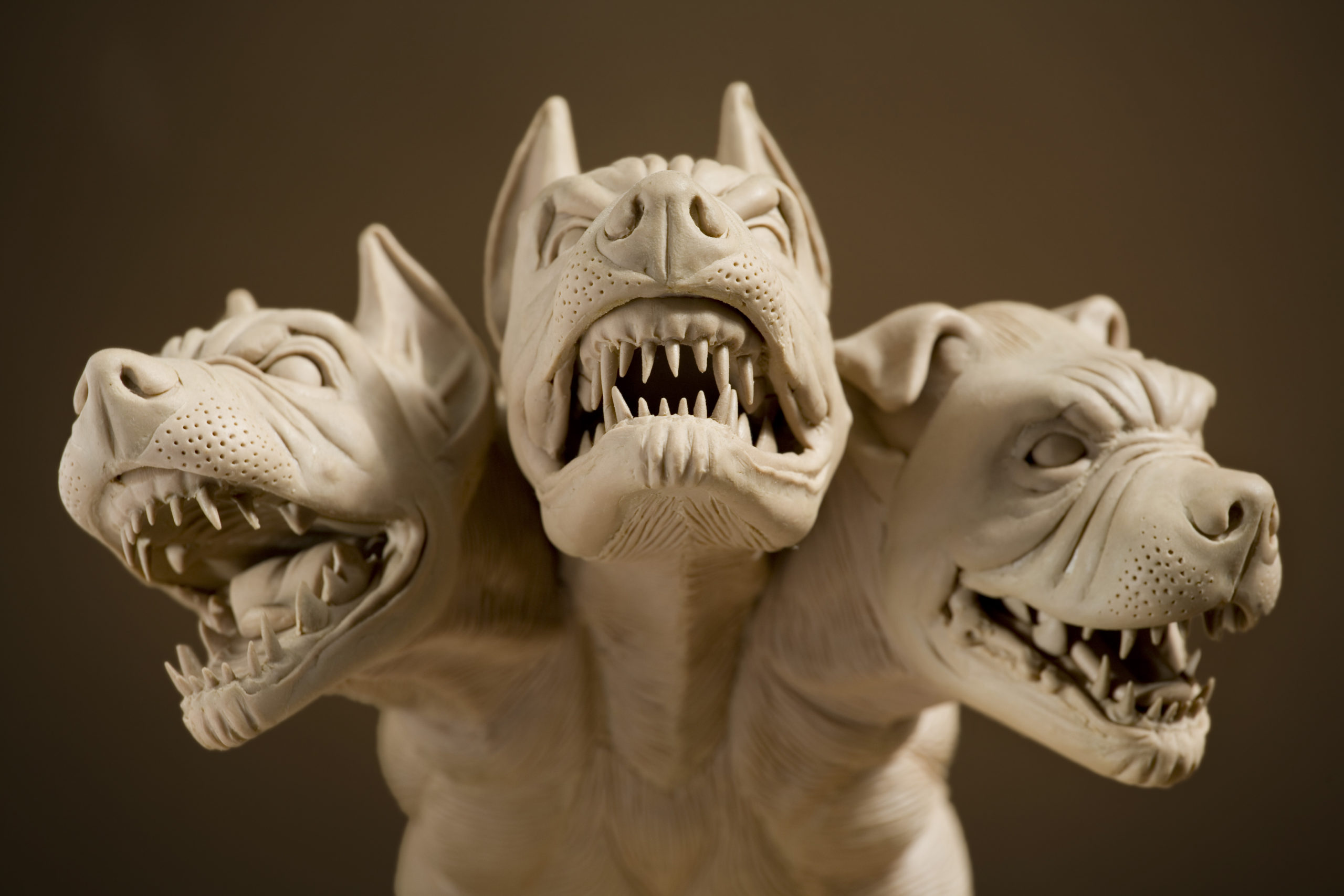Menu
Install the app
How to install the app on iOS
Follow along with the video below to see how to install our site as a web app on your home screen.
Note: This feature may not be available in some browsers.
You are using an out of date browser. It may not display this or other websites correctly.
You should upgrade or use an alternative browser.
You should upgrade or use an alternative browser.
Greek Mythology Community
The 7 most fierce monsters of Greek mythology
- Thread starter francescool
- Start date
1 - 2 of 2 Posts
k_tsoukalas
Administrator
There are some horrible monsters in Greek Mythology. They really make some of the stories interesting! Here's one of my favorites:

 www.greekboston.com
www.greekboston.com

Cerberus Leaves the Underworld
Learn all about how Cerberus, the creature who guarded the gates of Hades, came to leave the underworld.
1 - 2 of 2 Posts
JOIN THE DISCUSSION AND READ OTHER GREEK INFO:
Are there influences of Greek mythology in our modern culture?
- ssherie_
- Greek Mythology Forum
- Replies: 1
I've been deeply fascinated by Greek mythology for as long as I can remember—its epic tales, deities, and heroes that have influenced countless aspects of Western culture. Recently, I've started to ponder more deeply about its presence and influence in our contemporary life and culture. From literature and movies to expressions and brands, it seems Greek mythology has woven itself into the very fabric of our daily experiences.
I'm curious to hear your thoughts and observations on this topic. Have you noticed any interesting or surprising ways Greek mythology manifests in today's society? Perhaps in ways we might not even immediately recognize due to how integrated they are?
I'm curious to hear your thoughts and observations on this topic. Have you noticed any interesting or surprising ways Greek mythology manifests in today's society? Perhaps in ways we might not even immediately recognize due to how integrated they are?
Question about the Fates of Greek Mythology
- d_kakavouli
- Greek Mythology Forum
- Replies: 0
I am helping someone gather information for a school project on Greek Mythology so your input is much appreciated. This is more like, to help the person know enough information to be able to research it.
The project is about the Fates. These mysterious beings, often depicted as three sisters—Clotho, Lachesis, and Atropos—were believed to control the destiny of every mortal and god alike. Their thread-spinning, measuring, and cutting symbolized the weaving of each individual's life, from birth to death.
But what exactly was the extent of their power? How did they interact with other gods and mortals? These questions have sparked endless fascination and speculation among scholars and enthusiasts alike.
Were the Fates merely impartial observers, executing predetermined destinies without interference? Or did they possess agency, actively shaping the lives of those they governed? Furthermore, what implications did their existence hold for concepts of free will and determinism in ancient Greek thought?
The project is about the Fates. These mysterious beings, often depicted as three sisters—Clotho, Lachesis, and Atropos—were believed to control the destiny of every mortal and god alike. Their thread-spinning, measuring, and cutting symbolized the weaving of each individual's life, from birth to death.
But what exactly was the extent of their power? How did they interact with other gods and mortals? These questions have sparked endless fascination and speculation among scholars and enthusiasts alike.
Were the Fates merely impartial observers, executing predetermined destinies without interference? Or did they possess agency, actively shaping the lives of those they governed? Furthermore, what implications did their existence hold for concepts of free will and determinism in ancient Greek thought?
About Theogony by Hesiod
- toniiv
- Greek Mythology Forum
- Replies: 0
This poem has been one of my favorites for a while. I think everyone interested in Greek Mythology should read it! I thought I'd give you a summary:
Hesiod begins by invoking the Muses to guide him in recounting the story of the origins of the gods. He describes Chaos as the initial void from which the first gods emerged. From Chaos came Gaia (Earth), Tartarus (the Underworld), and Eros (Love), setting the stage for the creation of the cosmos.
Gaia gives birth to Uranus (the Sky), who becomes her husband and the father of the Titans, Cyclopes, and Hecatoncheires (Hundred-Handed Ones). Uranus, fearing the power of his offspring, imprisons them within Gaia's womb. Gaia urges her children to rebel, and her Titan son Cronus castrates Uranus, seizing power for himself.
Cronus becomes the ruler of the cosmos but fears a prophecy that one of his children will overthrow him. To prevent this, he swallows each of his children upon their birth, except for Zeus, who is saved by his mother Rhea and hidden away. Zeus grows up and defeats Cronus, establishing himself as the king of the gods.
The poem then describes the Titanomachy, the epic battle between Zeus and the Titans, which ends with the Titans' defeat and their imprisonment in Tartarus. Zeus and his siblings, the Olympian gods, become the rulers of the cosmos.
The narrative continues with the story of the Gigantomachy, the battle between the gods and the Giants, and other myths surrounding the gods' interactions with mortals and each other.
Hesiod begins by invoking the Muses to guide him in recounting the story of the origins of the gods. He describes Chaos as the initial void from which the first gods emerged. From Chaos came Gaia (Earth), Tartarus (the Underworld), and Eros (Love), setting the stage for the creation of the cosmos.
Gaia gives birth to Uranus (the Sky), who becomes her husband and the father of the Titans, Cyclopes, and Hecatoncheires (Hundred-Handed Ones). Uranus, fearing the power of his offspring, imprisons them within Gaia's womb. Gaia urges her children to rebel, and her Titan son Cronus castrates Uranus, seizing power for himself.
Cronus becomes the ruler of the cosmos but fears a prophecy that one of his children will overthrow him. To prevent this, he swallows each of his children upon their birth, except for Zeus, who is saved by his mother Rhea and hidden away. Zeus grows up and defeats Cronus, establishing himself as the king of the gods.
The poem then describes the Titanomachy, the epic battle between Zeus and the Titans, which ends with the Titans' defeat and their imprisonment in Tartarus. Zeus and his siblings, the Olympian gods, become the rulers of the cosmos.
The narrative continues with the story of the Gigantomachy, the battle between the gods and the Giants, and other myths surrounding the gods' interactions with mortals and each other.
12 Olympian Gods and Goddesses
- ssherie_
- Greek Mythology Forum
- Replies: 1
I love mythology and I thought I'd make list of the 12 Olympian Gods and Goddesses. This is my best guess. Do you know that I have seen different versions of this? What do you think?

- Zeus: The king of the gods, ruler of the sky and thunder, and the god of law, order, and justice.
- Hera: The queen of the gods, Zeus's wife and sister, and the goddess of marriage and childbirth.
- Poseidon: The god of the sea, earthquakes, and horses, often depicted with a trident.
- Demeter: The goddess of agriculture, fertility, and the harvest, responsible for the cycle of life and death in crops.
- Athena: The goddess of wisdom, warfare, strategy, and crafts, often associated with strategic warfare and civilization.
- Apollo: The god of music, poetry, prophecy, healing, and archery, known for his wisdom and beauty.
- Artemis: The goddess of the hunt, wilderness, childbirth, and virginity, often depicted with a bow and arrows.
- Ares: The god of war, violence, and bloodshed, embodying the brutal aspects of conflict.
- Aphrodite: The goddess of love, beauty, pleasure, and procreation, born from the sea foam and known for her irresistible charm.
- Hephaestus: The god of fire, blacksmiths, craftsmen, and volcanoes, renowned for his skill in metalworking.
- Hermes: The messenger of the gods, associated with travel, commerce, communication, and trickery.
- Dionysus: The god of wine, fertility, ecstasy, and theatre, representing the joyous aspects of life and celebration.

Afterlife Beliefs in Greek Mythology?
- toniiv
- Greek Mythology Forum
- Replies: 1
What did Ancient Greeks believe about the afterlife? I've heard a few different stories... I'm particularly drawn to Ancient Greece's take on life after death.
Was there a uniform belief system, or did it vary significantly among different cities or periods? How did their beliefs influence their daily life and practices? I'm also curious about the role of mythological figures like Hades and the concept of Elysium.
If anyone has any expertise, recommended readings, or can point me to resources where I might be able to gather detailed insights into these spiritual aspects of Ancient Greek culture, I would greatly appreciate it.
Was there a uniform belief system, or did it vary significantly among different cities or periods? How did their beliefs influence their daily life and practices? I'm also curious about the role of mythological figures like Hades and the concept of Elysium.
If anyone has any expertise, recommended readings, or can point me to resources where I might be able to gather detailed insights into these spiritual aspects of Ancient Greek culture, I would greatly appreciate it.
Share and discuss Greek mythology!
WorldwideGreeks.com is a free online forum community where people can discuss Greek food, travel, traditions, history and mythology.
Join Worldwide Greeks here!
Join Worldwide Greeks here!
JOIN COMMUNITY FOR FREE
LOGIN TO YOUR ACCOUNT



